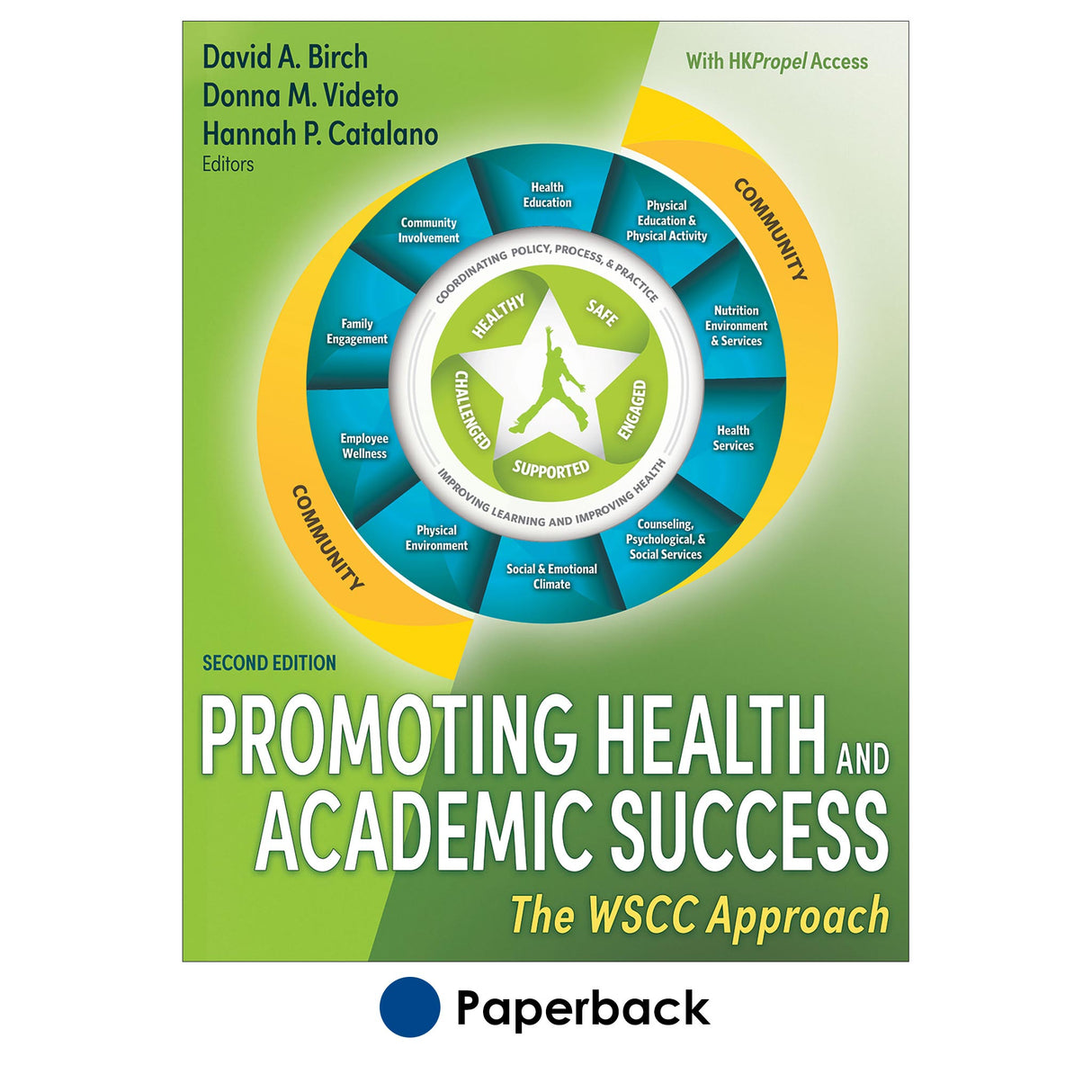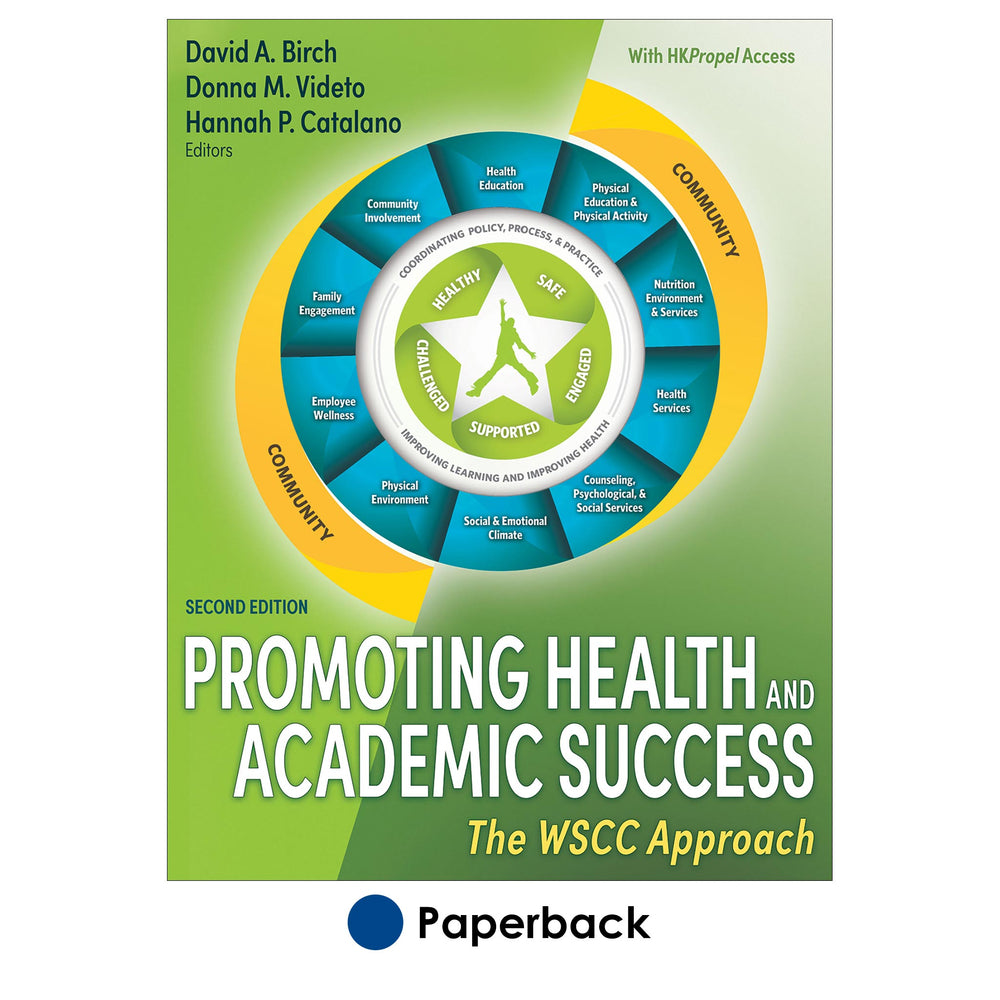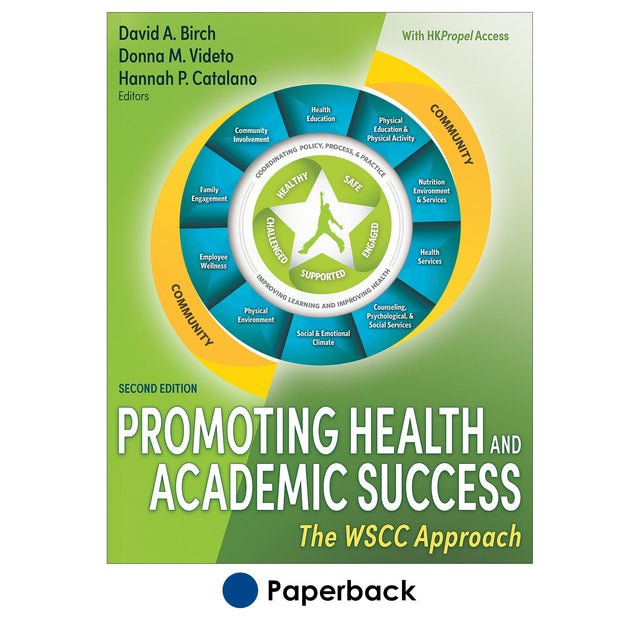Promoting Health and Academic Success 2nd Edition With HKPropel Access
The WSCC Approach
$85.00 USD
Promoting Health and Academic Success, Second Edition With HKPropel Access, boasts a team of editors and contributors who have experience as leaders in school health and WSCC at the national, state, and local levels. It provides direction for educators, school health professionals, and health agencies interested in promoting student health, diversity, equity, inclusion, and advocacy for the planning, implementation, and evaluation of the WSCC approach.
The second edition has been updated to incorporate the knowledge and experiences that have been gained since the first edition of the book:
- Discussion of new challenges for schools and communities such as COVID-19, school safety, and curriculum and programming decisions related to social justice and racism
- Real-world examples to provide practice and multiple perspectives on WSCC
- Application activities and case studies that engage students in applied learning within the context of WSCC simulations
- Related online learning tools, delivered in HKPropel, including review items, and project-based assignments
- Perspectives from WSCC leaders related to current practice and future WSCC considerations
Note: A code for accessing HKPropel is included with all new print books.
Audience
Undergraduate and graduate students in courses that focus on WSCC, school health, or children’s health; also state departments of education and agencies that address the health of school-age children and the interdependent relationship of education and health.David A. Birch, Hannah P. Catalano, and Donna M. Videto
Evolution of School Health
Moving From CSH to WSCC
WSCC Resources: Enhancing the Presence of the Model and Supporting WSCC in Practice
Summary
Learning Aids
References
Chapter 2. History of WSCC
Diane DeMuth Allensworth and Hannah P. Catalano
First Stage of Health Promotion: Addressing Infectious Diseases
Second Stage of Health Promotion: Addressing Individual Behaviors
Third Stage of Health Promotion: Addressing the Social Determinants of Health
Evolution of the WSCC Model
Summary
Learning Aids
References
Chapter 3. Overview of the WSCC Model
Hannah P. Catalano, David A. Birch, and Donna M. Videto
WSCC Model Overview
The 10 WSCC Components
School Health Index
Community as an Overarching WSCC Concept
Summary
Learning Aids
References
Chapter 4. Health and Academic Success
Michele Wallen
Health Risk Behaviors
Health and Education in Early Childhood
Adverse Childhood Experiences
Chronic Absenteeism
Making a Difference Through the WSCC Approach
Summary
Learning Aids
References
Chapter 5. Meeting the Needs of Diverse Students, Families, and Communities
Angelia M. Sanders
Students With Disproportionately Poor Education Outcomes
Diversity, Equity, and Inclusion
Considerations Related to Social Justice-Oriented Schools
Promoting Diversity, Equity, and Inclusion Through Cultural Humility
Incorporating Diversity, Equity, and Inclusion Into Family Engagement
Promoting Diversity, Equity, and Inclusion Through Community Involvement
Summary
Learning Aids
References
Chapter 6. Developing and Maintaining Collaborations
Bonni C. Hodges and Donna M. Videto
School–Family–Community Collaborations
Developing Successful Collaborations
Supporting Quality Collaborations
Barriers and Challenges to Collaboration
Recruiting Partners for Collaborations
Implementing and Sustaining Collaborations
Summary
Learning Aids
References
Chapter 7. Planning and Evaluating WSCC
Donna M. Videto and Bonni C. Hodges
Systematic Planning
Creating a Comprehensive Profile for Program Planning
Actions for Collecting Needs Assessment Profile Data
A Word About Data and Their Use
Evaluating WSCC
Planning for Program Evaluation
Summary
Learning Aids
References
Chapter 8. Implementing WSCC
Donna M. Videto, Hannah P. Catalano, and David A. Birch
Step 1. Establish Leadership With a Designated School Health Coordinator
Step 2. Secure Administrative Support and Develop a District-Level School Health Council and School Health Teams
Step 3. Identify Available Resources in the School, District, and Community
Step 4. After Reviewing the Initial Data, Determine the Outcomes of Greatest Priority
Step 5. Create an Action Plan Based on Realistic Goals and Objectives Agreed Upon by Partners
Step 6. Establish a Realistic Timeline for Implementing Strategies From the Action Plan
Step 7. Implement the Plan and Strategies
Step 8. Review and Implement the Evaluation Plan
Step 9. Provide Professional Development for Faculty and Staff
Step 10. Communicate Steps and Successes
Summary
Learning Aids
References
Chapter 9. Considerations for WSCC in Practice
A Perspective on the Role of State Education Agencies in Promoting WSCC
Rosemary Reilly-Chammat
The Role of the Federal Government in Education
The Role of the States in Education
Leadership by State Education Agencies in School Health
Frameworks to Support the Work: WSCC and the Multitiered System of Supports (MTSS)
Future Opportunities
References
Every School Healthy: An Urban School Case Study
Sue Baldwin and Assunta R. Ventresca
Needs Assessment and District Response
Key Stakeholder Engagement
Professional Development
Implications for School Health
References
A Synopsis of International Efforts to Improve School Health Programs
Lloyd J. Kolbe
The Need for International Efforts to Improve School Health Programs
U.S. and International School Health Program Frameworks
International Organizations Working to Improve School Health Programs
Journals of School Health
The Future of National and International Efforts to Improve School Health Programs
Summary
References
Teacher Education: Preparing Educators for WSCC Engagement
Elisa Beth McNeil
References
The Importance of Professional Development
Lori Paisley
WSCC Professional Development
Summary
References
Learning Aids
Chapter 10. Perspectives on WSCC in Practice
The American School Health Association’s Perspective on the WSCC Framework
Kayce D. Solari Williams and Randi J. Alter
The Role of the American School Health Association in Advancing the WSCC Framework
Working Across Disciplines for Student Success
The Role of Associations in Advancing WSCC Into the Future
References
Society for Public Health Education: Champion for Quality School Health Education
M. Elaine Auld
The Early Years
Ramping Up Efforts
WSCC Takes Center Stage
Moving Forward
References
The Whole Campus Model: A WSCC Framework for Health Promotion on College Campuses
Bonni C. Hodges, Donna M. Videto, and Alexis Blavos
The Whole College Student
The Whole Campus Model
Summary
References
The Need for a WSCC-Based School Health Research Agenda
Michael J. Mann
The Importance of School Health and School Health Research
The Promise of the WSCC Model
Outstanding Questions Shaping the Future of WSCC-Based School Health Research
The Promise of a WSCC-Based Research Agenda for School Health
Elements of an Effective Process
Imagining the Future of WSCC
Summary
References
WSCC: A Future Perspective
Sean Slade
A Model for Our Times
Pandemic as a Cure
The Rise of WSCC
Where We Are Going
A Culture of Well-Being
Toward a Healthy Future
References
Learning Aids
Birch is a past president of the American Association for Health Education (AAHE) and the Society for Public Health Education (SOPHE). He has served on the board of directors of AAHE, the American School Health Association (ASHA), and the National Association of Health Education Centers as well as on the SOPHE board of trustees. He is currently a board member of the Foundation for the Advancement of Health Education (FAHE) and is on the editorial board of Health Education & Behavior. He is a former editorial board member for the Journal of School Health, Pedagogy in Health Promotion: The Scholarship of Teaching and Learning, and the American Journal of Health Studies.
Birch is a charter fellow of AAHE and an ASHA fellow. He has received the highest professional award from three organizations—the ASHA William A. Howe Award (2019), the SOPHE Distinguished Fellow Award (2018), and the Eta Sigma Gamma Honor Award (2015)—along with numerous other professional awards. He was Illinois State University's 2008 Ann E. Nolte Scholar in Health Education. As a faculty member at Indiana University, he received the Trustees’ Teaching Award and the Teaching Excellence Recognition Award.
Donna M. Videto, PhD, RMCHES, is a SUNY distinguished service professor and professor emerita of health. She has worked in school health education and pedagogy for over 40 years. She has worked with school districts in Pennsylvania, Virginia, and New York to advance school health and the WSCC model, and she taught K-12 health education early in her career. Currently she works in international education, developing courses and teaching in Italy and the Czech Republic.
Recently retired from SUNY Cortland, where she taught graduate and undergraduate students in health education and education, Videto also served as the coordinator of student teaching in health education and the director of the faculty development center. She has written over 30 publications, including the books Promoting Health and Academic Success: The Whole School, Whole Community, Whole Child Approach and 2011 Needs Assessment and Program Planning for Health Education and Health Promotion, and she has made over 150 national, regional, and state-level presentations at conferences and as part of her committee work for SOPHE, AAHE, and ASHA. An AAHE fellow and recipient of the Delbert Oberteuffer Mortar Board for excellence in school health education preparation, she recently completed her position as the vice president of the Foundation for the Advancement of Health Education (FAHE) and currently serves as a scholarship application reviewer for that foundation.
Hannah P. Catalano, PhD, MCHES, is an associate professor of public health at University of North Carolina–Wilmington (UNCW). She currently serves on the board of directors for the American School Health Association (ASHA) and cochairs the ASHA Research and Publications Committee. She is an editorial board member for the Journal of School Health, a member of the National Committee on the Future of School Health Education, and a member of the SOPHE Think Tank work group that provides strategic direction on the Institute for Higher Education Academy.
Catalano is a founding faculty fellow of the UNC-UNCW Research Collaboratory in the College of Health & Human Services at UNCW. She also founded and currently leads the university’s Whole School, Whole Community, Whole Child Research Collaboratory (WSCCRC), which is a unique initiative to engage college students in scholarly discussions around WSCC and to facilitate meaningful research on the model. She previously served as a member of the National Consensus for School Health Education’s Expert Review Group and is a former Future Leaders Academy Fellow of ASHA and NextUp Leadership Development Fellow of UNCW.
Innovative pilot project helps reduce chlamydia rates among youth in rural Florida county
Moving from the Comprehensive School Health (CSH) program to the Whole School, Whole Community, Whole Child (WSCC) model
All ancillaries are free to adopting instructors through HKPropel.
Instructor guide. Includes chapter objectives, a course syllabus, review items, application activities, and rubrics.
Presentation package. Features more than 180 PowerPoint slides of text, artwork, and tables from the book that can be used for class discussion and presentation. The slides in the presentation package can be used directly within PowerPoint or printed to make handouts for students. Instructors can easily add, modify, and rearrange the order of the slides.
Instructors also receive access to all student materials in HKPropel. For Promoting Health and Academic Success, Second Edition, this includes a list of key points to review, application activities, project-based assignments, additional resources, and flash cards for vocabulary study.





